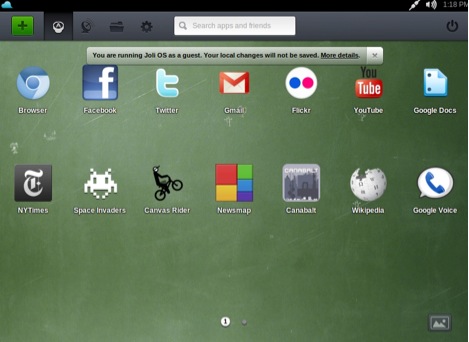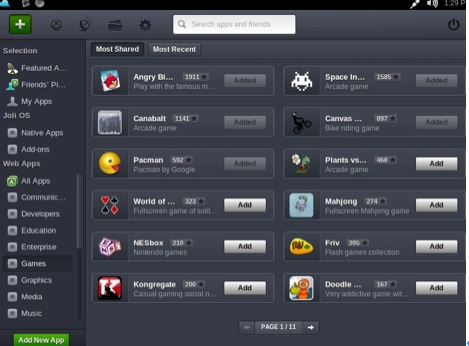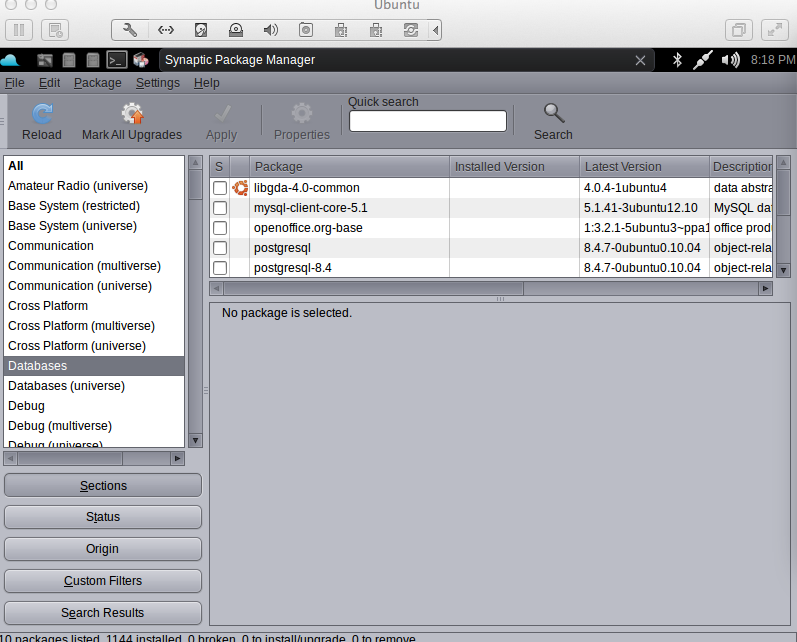COMP 3000 2011 Report: Joli OS: Difference between revisions
| (9 intermediate revisions by the same user not shown) | |||
| Line 44: | Line 44: | ||
== Software packaging == | == '''Software packaging''' == | ||
Joli os uses deb as its packaging format. The utility to manage the package in the distribution are synaptic package manager. When you enter the synaptic, you can find the the window in the left is package brower on the left, the package list is on the upper right, and the lower right is package detail. | Joli os uses deb as its packaging format. The utility to manage the package in the distribution are synaptic package manager. When you enter the synaptic, you can find the the window in the left is package brower on the left, the package list is on the upper right, and the lower right is package detail. | ||
[[File:Example4. | [[File:Example4.png]] | ||
To add web package, you can go to app center to add the packages you like by press ‘+’ in the top of desktop. To add native package, you need to open the “local settings” to open the GNOME setting panel, then select synaptic package manager, and use synaptic to install the program you want. | To add web package, you can go to app center to add the packages you like by press ‘+’ in the top of desktop. To add native package, you need to open the “local settings” to open the GNOME setting panel, then select synaptic package manager, and use synaptic to install the program you want. | ||
| Line 56: | Line 56: | ||
The software in Joli os’s app center is very varied. You can find all kind of package here, education, entertainment, communication, etc. | The software in Joli os’s app center is very varied. You can find all kind of package here, education, entertainment, communication, etc. | ||
You also can share the package with your friends,or find some remmonded apps in the app center. | You also can share the package with your friends,or find some remmonded apps in the app center. | ||
== '''version of main packages''' == | |||
Linux kernel 2.6.35.10 http://www.kernel.org/ | |||
Glibc 2.11.1 http://www.gnu.org/software/libc/libc.html | |||
Gcc 4.4.3 http://gcc.gnu.org/ | |||
Freetype 2.3.11 http://freetype.sourceforge.net/index2.html | |||
Alsa-lib 1.0.22 http://www.alsa-project.org/main/index.php/Main_Page | |||
Nvidia 260.19.29 http://www.nvidia.com/object/unix.html | |||
Module-init-tools 3.11.1 https://modules.wiki.kernel.org/ | |||
Openssl 0.9.8k http://www.openssl.org/ | |||
Chromium r75062 http://code.google.com/chromium/ | |||
Python 2.6.5 http://www.python.org/ | |||
'''Linux kernel''' | |||
The kernel in joli os is linux 2.6.35.10. it was released on Dec 15th 2010. The | |||
Lastest version is 3.2-rcl which is announced on Nov 8th 2011. The author of Joli OS hasn’t modified the kernel. Because this distribution is based on Ubuntu so the linux kernel is the standard install in it. | |||
'''Glibc''' | |||
The version of glibc in this distribution is 2.11.1, which released in October 2009. The latest version is 2.14 .It was announced in June 2011. It’s hasn’t been modified at all. Glibc’s common use is in systerms using the Linux kernel on X86 hardware, so it’ s chosen to be one of the standard install. | |||
'''Gcc''' | |||
The version of gcc in this distribution is 4.4.3 that is released in January 21, 2010. The latest version is GCC 4.6.2, which released on October 26, 2011. It hasn’t been modified. Gcc includes front ends for c,c++,objective-c, fortran, java, Ada, and Go, as well as libraries for these languages. And GCC is a free software and work well on Linux, so it’s chosen for the standard install. | |||
'''Freetype''' | |||
The version of free type is 2.3.11, which released in October 10,2010. The latest version is 2.4.7,which released on October 18,2011. The package hasn’t been modified by the author. Freetype2 is a software font engine that is small, efficient, highly customizable portable while capable of producing high-quality output, so it’s chosen for the standard install. | |||
'''Alsa-lib''' | |||
The version of alsa-lib is 1.0.22, which released in 2009-12-16. The latest version is 1.0.24, which released on 2011-01-31. The author hasn’t modified the package. Alsa can provides audio and MIDI functionality to the Linux operating system. And it efficient support for all types of audio interfaces, from consumer sound cards to professional multichannel audio interfaces, so it is chosen for the standard install. | |||
'''NVIDIA''' | |||
The version of nvidia is 260.19.29, which released in 2010-19-29. The latest version is 285.05.09, which released on 2011-10-5. NVIDIA is the world leader in visyal computing technology so it is chosen for the standard install. | |||
'''module-init-tools''' | |||
The version of module-init-tools in this distribution is 3.11.1 (I cannot find when it released). The latest version is 3.12, which released on 2010-06-07. The author hasn’t modified the package. It’s a set of program for loading, inserting, and removing kernel modules of Linux, so it is chosen for standard install. | |||
'''Openssl''' | |||
The version of openssl in this distribution is 0.9.8k, which released on 2010-3-29. The latest version is 1.0.0e, which released on 2011-9-6. The author hasn’t modified the package. It a collaborative effort to develop a robust, commercial-grade, full-featured, and Open Source toolkit implementing the Secure Sockets Layer (SSL v2/v3) and Transport Layer Security (TLS v1) protocols as well as a full-strength general purpose cryptography library, so it is chosen for the standard install. | |||
'''Chromium''' | |||
The version of chromium is r75062, which released on December 2010. The latest version is chromium 17, which released on 2011-20-19. The author hasn’t modified the package. Chromium is one of the most worldwide used web browser project which Google chrome draws its source code. It helps buid a safer ,faster, and more stable way for internet user to experience the web and create a powerful platform for developing a new generation of web application,what’s why it’s chosen for the standard install. | |||
'''Pyhon''' | |||
The version of pyhon in this distribution is 2.6.5, which released on 2010-3-19. The latest version is 3.2.2, which released on 2011-9-4. The author hasn’t modified the package. Pyhon is a remarkable power dynamic programming language that is used in a wide variety of application domains, and it is available for all major operating system. So it’s chosen for standard install. | |||
== '''References: ''' == | == '''References: ''' == | ||
Latest revision as of 21:09, 12 November 2011
Background:
The name of this operating system is Joli OS, which is especially designed for netbook users. The operating system was developed from “Jolicloud”. After version 1.2 was released, the company renamed it to “Joli OS”.
“Jolicloud is a new computing platform which makes the cloud more simple and more open. Jolicloud wants to connect users to all of their online applications, social media, videos, photos and files from any device in the world.” - Jolicloud's website homepage
Joli OS a free Linux operating system based on Ubuntu. It was designed for easy installation, with Wi-Fi, Bluetooth, and 3G modem support all included. The operating system supports all the major netbooks, including models from Asus, Acer, Dell, HP, MSI, Samsung, and Sony. Jolicloud claims the OS supports 98% of netbooks with out-of-the-box compatibility but also works on a very large number of other devices, up to 10 years old: laptops, desktops and even tablets.
The company Jolicloud was founded in Paris in 2009 by Tariq Krim and Romain Huet. You needed an invitation to download it when first released. But it’s totally free now – no charge for download or use. Just sign up an account at its website and you can enjoy the entertainment or anything else in Joli OS immediately. The size of the latest Joli ISO file is about 691 MB. If you don't like to use virtual machines, you can download an executable file from the site as well.
Installation/startup:
I used the VM VirtualBox to run the Joli OS ISO file as follows
- Step 1, I create a new virtual machine.
- Step 2, start the virtual machine and put the ISO in to load it. The starting interface is like Screenshot 1 (the pictures are placed below this description). After choose the language, time zone, keyboard type, and disk where you want install in, the installation began. It takes about 12 minutes to install Joli OS in my computer completely. The virtual machine needed to be restarted to run the Joli OS. There is an attention here, the computer must be connected to the Internet, or the installation won't be successful. Then after typing into your account of Jolicloud (Facebook account is also accepted), the desktop will appear.
If you want to try the Joli OS, just choose the "try Joli OS without installing” option and you can use it disposably. The steps are the same as above.
Screenshot 1:
Basic Operation:
Joli OS has a very nice and concise desktop. (A picture of the desktop is placed below this description). The interface is very clear and easy to understand how to use since it is made for netbooks. You can find many applications which you are very familiar with are already in the desktop, like Facebook, Twitter, Skype, Gmail, Youtube, etc. So it's very convenient that you don't need to take extra time to download them from the Internet. Look at the top-right of the desktop, there is a "+" mark, press it and you'll find many more applications here, sorting out into many sections, like games, education, communication etc.(a picture of it is placed below this description) Find the application you want, just‘add’ it. It’s really easy and fast. Most of apps in app center are free here except some manage applications. What's more, every Joli OS user has a public page where they can share the apps with other users, so you can find some apps that are recommended by other users. It really does help. In the bottom-right of the desktop, you can find the button to change the desktop background.
I tried some softwares in the desktop, like Twitter, Facebook and some games. It's just like some weblinks in the desktop, when you click it, it shows the webpage which you just open in the browser.
There are some local applications in the Joli OS, like calculators, text editor, dictionary, movie player, sound recorder, etc. The default form of the text editor is HTML, which can be easily edited in any other primary operating system at present. The movie player also supports many forms of video file, like avi, rm, wav, etc.
Screenshot of desktop
Screenshot of application center
Usage Evaluation:
During those several days using Joli OS, I really liked it. There are 3 points that made it meet its design goals. First, it won't take much space of a hard disk. Netbooks have smaller hard disk generally. Joli OS saves more personal space for users. Second, it has a simple and clear interface with one press to open, and one press to shut down. Third, the easy application install system, as netbooks are mainly used for surfing the Internet. The applications in Joli OS are enough for basic entertainment.
However, Joli OS still has a big space to improve. For example, I feel the application serves depends on Internet is a little bit slow. The recommended application update is too slow (the latest shared app is 128 days ago) because the lack of users. And the file manager system of the hard disk can still be developed. But those problems above won't affect general use.
I know there aren't many people using Joli OS nowadays. The overwhelming majority of manufacturers and users of netbooks still would like to use Windows because of its strong compatibility. I agree that Windows is much more well-developed than Joli OS. However, Joli OS just a new OS that has not been popularized. In the future, when it become much more commonplace, Joli OS may be used in primary netbook widely. Even now, if you are tired of Windows, Joli OS may be a good choice.
Software packaging
Joli os uses deb as its packaging format. The utility to manage the package in the distribution are synaptic package manager. When you enter the synaptic, you can find the the window in the left is package brower on the left, the package list is on the upper right, and the lower right is package detail.
To add web package, you can go to app center to add the packages you like by press ‘+’ in the top of desktop. To add native package, you need to open the “local settings” to open the GNOME setting panel, then select synaptic package manager, and use synaptic to install the program you want.
To remove a package, just move your mouse to the icon, press the ‘x’ on the icon, the package is easily be moved.
The software in Joli os’s app center is very varied. You can find all kind of package here, education, entertainment, communication, etc. You also can share the package with your friends,or find some remmonded apps in the app center.
version of main packages
Linux kernel 2.6.35.10 http://www.kernel.org/
Glibc 2.11.1 http://www.gnu.org/software/libc/libc.html
Gcc 4.4.3 http://gcc.gnu.org/
Freetype 2.3.11 http://freetype.sourceforge.net/index2.html
Alsa-lib 1.0.22 http://www.alsa-project.org/main/index.php/Main_Page
Nvidia 260.19.29 http://www.nvidia.com/object/unix.html
Module-init-tools 3.11.1 https://modules.wiki.kernel.org/
Openssl 0.9.8k http://www.openssl.org/
Chromium r75062 http://code.google.com/chromium/
Python 2.6.5 http://www.python.org/
Linux kernel
The kernel in joli os is linux 2.6.35.10. it was released on Dec 15th 2010. The Lastest version is 3.2-rcl which is announced on Nov 8th 2011. The author of Joli OS hasn’t modified the kernel. Because this distribution is based on Ubuntu so the linux kernel is the standard install in it.
Glibc
The version of glibc in this distribution is 2.11.1, which released in October 2009. The latest version is 2.14 .It was announced in June 2011. It’s hasn’t been modified at all. Glibc’s common use is in systerms using the Linux kernel on X86 hardware, so it’ s chosen to be one of the standard install.
Gcc
The version of gcc in this distribution is 4.4.3 that is released in January 21, 2010. The latest version is GCC 4.6.2, which released on October 26, 2011. It hasn’t been modified. Gcc includes front ends for c,c++,objective-c, fortran, java, Ada, and Go, as well as libraries for these languages. And GCC is a free software and work well on Linux, so it’s chosen for the standard install.
Freetype
The version of free type is 2.3.11, which released in October 10,2010. The latest version is 2.4.7,which released on October 18,2011. The package hasn’t been modified by the author. Freetype2 is a software font engine that is small, efficient, highly customizable portable while capable of producing high-quality output, so it’s chosen for the standard install.
Alsa-lib
The version of alsa-lib is 1.0.22, which released in 2009-12-16. The latest version is 1.0.24, which released on 2011-01-31. The author hasn’t modified the package. Alsa can provides audio and MIDI functionality to the Linux operating system. And it efficient support for all types of audio interfaces, from consumer sound cards to professional multichannel audio interfaces, so it is chosen for the standard install.
NVIDIA
The version of nvidia is 260.19.29, which released in 2010-19-29. The latest version is 285.05.09, which released on 2011-10-5. NVIDIA is the world leader in visyal computing technology so it is chosen for the standard install.
module-init-tools
The version of module-init-tools in this distribution is 3.11.1 (I cannot find when it released). The latest version is 3.12, which released on 2010-06-07. The author hasn’t modified the package. It’s a set of program for loading, inserting, and removing kernel modules of Linux, so it is chosen for standard install.
Openssl
The version of openssl in this distribution is 0.9.8k, which released on 2010-3-29. The latest version is 1.0.0e, which released on 2011-9-6. The author hasn’t modified the package. It a collaborative effort to develop a robust, commercial-grade, full-featured, and Open Source toolkit implementing the Secure Sockets Layer (SSL v2/v3) and Transport Layer Security (TLS v1) protocols as well as a full-strength general purpose cryptography library, so it is chosen for the standard install.
Chromium
The version of chromium is r75062, which released on December 2010. The latest version is chromium 17, which released on 2011-20-19. The author hasn’t modified the package. Chromium is one of the most worldwide used web browser project which Google chrome draws its source code. It helps buid a safer ,faster, and more stable way for internet user to experience the web and create a powerful platform for developing a new generation of web application,what’s why it’s chosen for the standard install.
Pyhon
The version of pyhon in this distribution is 2.6.5, which released on 2010-3-19. The latest version is 3.2.2, which released on 2011-9-4. The author hasn’t modified the package. Pyhon is a remarkable power dynamic programming language that is used in a wide variety of application domains, and it is available for all major operating system. So it’s chosen for standard install.
References:
http://www.iplaysoft.com/jolicloud.html
http://baike.baidu.com/view/3052819.htm
http://www.crunchbase.com/company/jolicloud



